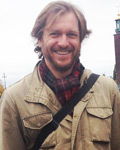2004, 2014
Robert Bird
- Associate Professor
- University of Chicago

Abstract
In modern Russia imaginative narratives quickly became a major source of cultural self-consciousness. Critics expected them to bear benefits in non-aesthetic spheres, whether social justice or religious enlightenment. In modernism especially, the cultural need for artistic narratives was complicated by a suspicion of fiction as such. This led to the development of innovative narrative genres such as the mystery play, chronicle, verse tale, and "non-narrative." In aesthetic theory this development was matched by a definition of art as ritual and on aesthetic concepts of distanciation (the Formalists' "estrangement," Bakhtin's "outsideness," Losev's "detachment," etc.). Concepts of distance and strategies for suspending narrative provide a unified framework for describing Russian modernism.
Abstract
Against the standard view of socialist realism as anti-art and mere propaganda, this project argues that this aesthetic mode – dominant in the USSR between 1932 and 1991 – marked the institutionalization of aesthetics as a privileged site of socialist construction. Far from being a crude imposition of ideology on culture, in its formative years, 1932-1937, Soviet cultural authorities relied on artists and their critics to produce socialist realism by transforming their artistic practices in discourse with ideological and social imperatives. This project takes seriously the forms, mediums and materials that Soviet artists and their critics employed in order to make socialism conceivable, visible, and palpable. Through a coherent set of model-studies of concrete aesthetic problems faced by major artists and critics, mainly in literature and film, from Andrei Platonov and Boris Pasternak to Aleksandr Dovzhenko and Aleksandr Medvedkin, it shows how socialist realism worked, or failed to work, as theory and artistic practice.

